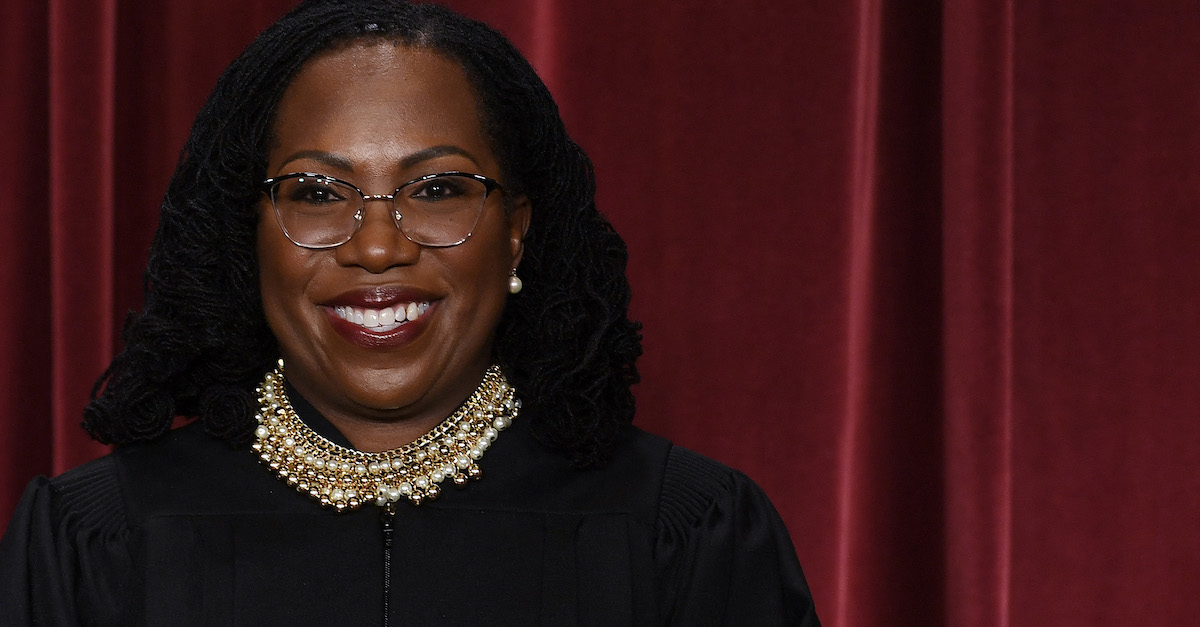
Associate U.S. Supreme Court Justice Ketanji Brown Jackson poses for the official photo at the Supreme Court in Washington, D.C. on October 7, 2022.
The U.S. Supreme Court on Tuesday signed off on the execution of Missouri death row inmate Kevin Johnson, 37. He was killed by the state later that day. On Wednesday evening, in an unusual move, Justice Ketanji Brown Jackson released a post-execution dissent.
The capital case before the nation’s high court argued, unsuccessfully, that Johnson was prosecuted and put to death “not for his crimes, but because he [was] Black and his victim was White.”
In the inmate’s denied application for a stay, his death penalty counsel noted an oddity in the case – that it was not Johnson himself, but, rather, the prosecuting office that originally convicted him which was the first party to file for a reset and review of the entire matter.
“The claim of discrimination was not brought by Mr. Johnson, but by the very entity, through a duly appointed special prosecutor, that had put him on death row,” Johnson’s attorney wrote. “The special prosecutor’s proffer provided strong evidence of racial discrimination.”
Missouri law provides that prosecuting attorney’s offices are entitled to a three-step post-conviction review process that allows them to assess the strength and validity of final convictions.
As it turned out, the long-serving St. Louis County prosecuting attorney, Robert “Bob” P. McCulloch, the application said, systematically treated Black and white defendants differently.
McCulloch, who once caused Oregon prosecutors to walk out of a speech due to his “offensive” comments about Black people, had a controversial record on race. He famously declined to charge then-officer Darren Wilson in the death of Michael Brown Jr., and went on to be defeated in the 2018 Democratic primary by reformist and onetime public defender Wesley Bell. McCulloch is also known for being one of the most aggressive death penalty-seeking prosecuting attorneys in U.S. history.
Special prosecutor Edward Keenan found that McCulloch only sought the death penalty for Black defendants accused of killing police officers. The sole white defendant accused of killing a cop who came before McCulloch was spared the effort.
Additionally, the special prosecutor found, McCulloch made a “deliberate” effort to exclude Black jurors from Johnson’s trial.
“These facts and others leave no serious doubt that Mr. McCulloch’s office discriminated,” Keenan wrote. “The judgment must be set aside so that a lawful trial and sentence may proceed.”
In the dissent, which was joined by Justice Sonia Sotomayor, Jackson largely stuck to the procedure of the operative Missouri law and the way that law acts in tandem with constitutional guarantees.
“Missouri has created a system in which prosecutors may assess the validity of a state prisoner’s final conviction, and having done so, it was required to comply with due process when applying that law in Johnson’s case.” she explains. “In rare cases, a litigant can credibly claim that a State’s erroneous interpretation of, or refusal to comply with, its own law can amount to a federal due process violation. This is one of those rare cases.”
The newly-minted justice explains how the law is supposed to work:
Missouri’s Revised Statute §547.031 provides a three-step process for reviewing the integrity of a conviction. First, a prosecutor can file a motion to vacate if she “has information that a convicted person . . . may have been erroneously convicted.” §547.031.1. A prosecutor filed such a motion with respect to Johnson. Second, “upon the filing of [such] a motion to vacate,” the court “shall order a hearing and shall issue findings of fact and conclusions of law on all issues presented.” §547.031.2. No Missouri court here has disputed that this hearing is mandatory or that it was not provided to Johnson. Third, the court must grant the motion to vacate if “the court finds there is clear and convincing evidence of . . . constitutional error,” after “tak[ing] into consideration” all of the evidence related to the case, including the “evidence presented at the hearing on the motion.” §547.031.3.
Instead, Jackson wrote, the Missouri Supreme Court “turned this straightforward procedural statute on its head” by explaining away Johnson’s denied hearing. This hearing wasn’t really mandatory, the Show-Me State’s highest court said, because the special prosecutor’s argument about racial bias did not rise to the level of “constitutional error” that “undermine[d] the confidence in the judgment.”
Shying away from those specific arguments, the dissent said this was about due process and mandates that were ignored.
“The Missouri Supreme Court’s reading—which skipped over the mandatory second step of the State’s conviction review process and went straight to the third—flouted the plain language of a statute that clearly contemplates that the three required steps will proceed in order,” Jackson wrote, with emphasis on the temporal aspect.
“In short, a State cannot provide a process for postconviction review (like that outlined in [the Missouri statute]) and then arbitrarily refuse to follow the prescribed procedures,” the dissent continues. “But that appears to be what happened in this case.”
Jackson, near the end of the brief dissent, proceeds to quickly take stock of the racial bias arguments [emphasis in original]:
If the required hearing had been held, someone might have pointed out that [Missouri law] itself “permits a prosecuting attorney to present all evidence relevant to such claims, regardless of whether the defendant is procedurally defaulted from raising such claims.” In any event, it appears that much of the evidence that could have been presented at the nonexistent hearing was new evidence relating to the trial prosecutor’s racially biased practices and racially insensitive remarks. And now that evidence will not be considered on the merits by any court, much less the one that was supposed to base its conclusions about the validity of Johnson’s conviction on all such evidence, per the statutory mandate.
[Image via OLIVIER DOULIERY/AFP via Getty Images]